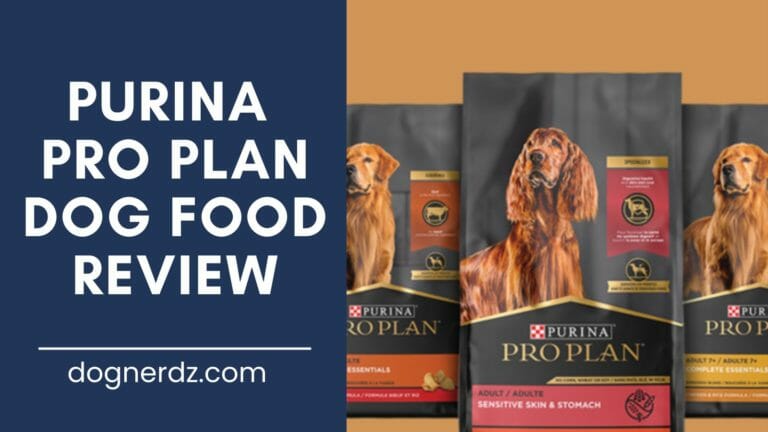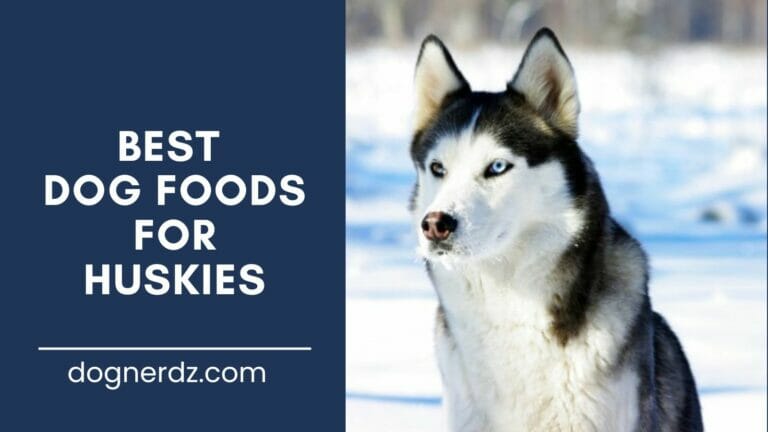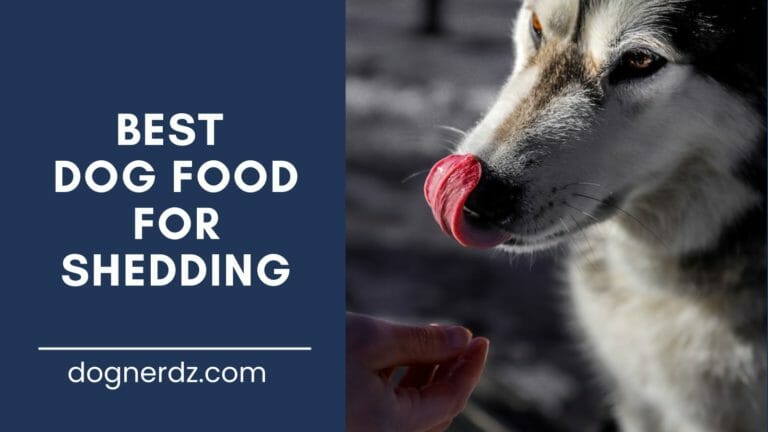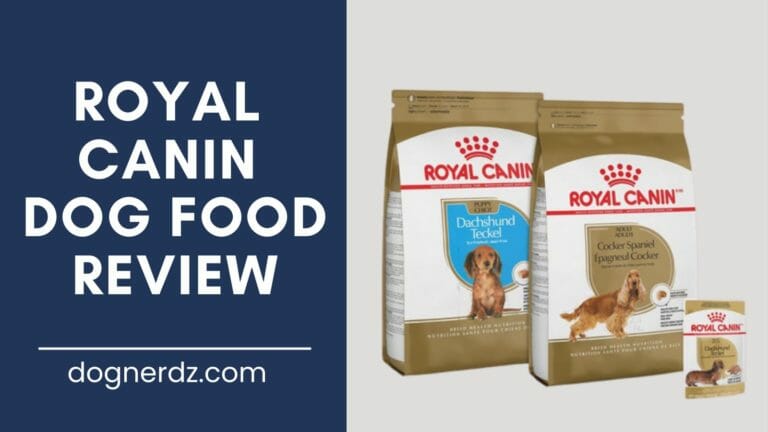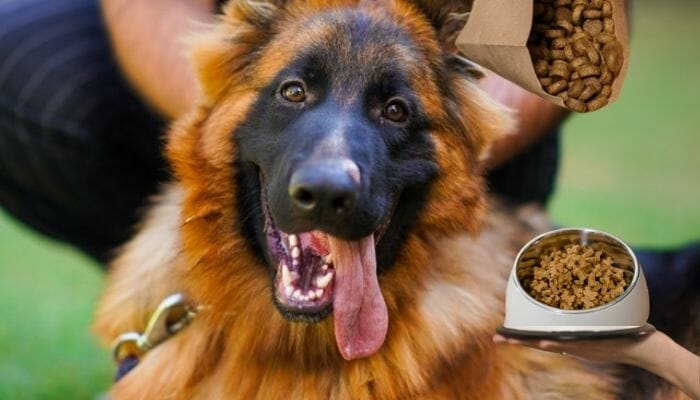The Role of Fat in Canine Nutrition and Diets
When it comes to keeping our furry friends healthy and happy, a balanced diet is essential. Just like humans, dogs need a variety of nutrients to thrive.
These nutrients include proteins, carbohydrates, fats, vitamins, and minerals. Each of these nutrients plays a crucial role in supporting various bodily functions and promoting overall health and well-being.
In this article, we will focus specifically on the role of fat in canine nutrition. Fat is often misunderstood and associated with negative connotations, but it is actually an important component of a dog’s diet.
Let’s dive into the world of fat and explore its significance in keeping our four-legged companions healthy.
Table of Contents
Understanding Fat’s Role in Canine Nutrition
Before we delve into the role of fat in a dog’s diet, let’s first understand what dietary fat is.
Fat is a macronutrient that provides a concentrated source of energy. It is made up of fatty acids, which can be categorized into different types, including saturated fats, unsaturated fats, and trans fats.
- Saturated fats are solid at room temperature and are commonly found in animal-based products like meat and dairy.
- Unsaturated fats, on the other hand, are liquid at room temperature and are typically derived from plant-based sources like oils.
- Trans fats are artificially created through a process called hydrogenation and are often found in processed foods.
When it comes to dogs, not all fats are created equal. While some fats can be beneficial and support their overall health, others can be harmful.
Essential Fatty Acids for Dogs
Essential fatty acids, such as omega-3 and omega-6 fatty acids, are particularly important for dogs. These fatty acids cannot be produced by the body and must be obtained through their diet.
Omega-3 and omega-6 fatty acids are essential for dogs’ health. They play a vital role in maintaining healthy skin and coat, promoting brain development, supporting the immune system, and reducing inflammation.
Sources of essential fatty acids in a dog’s diet include fish oil, flaxseed oil, and certain types of fish like salmon and sardines.
These sources provide the necessary omega-3 fatty acids, such as EPA (eicosapentaenoic acid) and DHA (docosahexaenoic acid), which are crucial for brain function and development.
According to one study from 1998, omega-3 fatty acids have even been shown to have anti-inflammatory and immune-boosting effects.
Omega-6 fatty acids can be found in plant-based oils like sunflower oil and safflower oil.
While omega-6 fatty acids are important, it’s crucial to maintain a proper balance between omega-3 and omega-6 fatty acids in a dog’s diet.
The ideal ratio is generally considered to be between 5:1 and 10:1 (omega-6 to omega-3).
Role of Fat in Energy Provision
One of the primary roles of fat in a dog’s diet is to provide energy. Fat is a highly concentrated source of energy, containing more than twice the calories per gram compared to proteins and carbohydrates.
This makes fat an efficient fuel source for dogs, especially those with high energy requirements.
Compared to proteins and carbohydrates, fat provides a longer-lasting source of energy. When a dog’s body digests fat, it is broken down into fatty acids, which can be stored in the body as a reserve source of energy.
This reserve can be tapped into when a dog’s energy needs are not met through their regular diet.
The Role of Fat in Digestion
Fat also plays an important role in the digestion and absorption of nutrients. When a dog consumes fat, it triggers the release of bile from the gallbladder, which helps break down fat into smaller particles.
This process, known as emulsification, allows fat to be more easily digested and absorbed in the small intestine.
Proper fat digestion is essential for overall digestive health. When fat is not properly digested, it can lead to digestive issues such as diarrhea, gas, and bloating. It can also interfere with the absorption of fat-soluble vitamins, which are essential for a dog’s health.
The Role of Fat in the Immune System
Fat plays a crucial role in supporting a dog’s immune system. It helps regulate inflammation and supports the body’s defense against infections and diseases. Essential fatty acids, such as omega-3 fatty acids, have been shown to have anti-inflammatory properties and can help modulate the immune response.
In addition to omega-3 fatty acids, certain types of fats, such as those found in fish oil, can enhance the production of antibodies and improve the function of immune cells. This can help strengthen a dog’s immune system and protect them from various illnesses.
The Role of Fat in Brain Development
Fat is essential for the development and maintenance of the brain and nervous system in dogs. The brain is made up of approximately 60% fat, and a deficiency in fat can have detrimental effects on cognitive function.
Omega-3 fatty acids, in particular, are crucial for brain development. They play a vital role in the formation of cell membranes and the structure of brain cells. Studies have shown that dogs fed diets rich in omega-3 fatty acids have improved cognitive function and memory.
Functions and Benefits of Fat in Canine Nutrition
Now that we understand the various roles fat plays in a dog’s diet, let’s explore the specific functions and benefits of fat in more detail.
Promotion of Healthy Skin and Coat
Fat is essential for maintaining healthy skin and a shiny coat in dogs. It helps prevent dryness, itchiness, and flakiness by providing moisture and nourishment to the skin. Fat also helps regulate oil production, keeping the skin hydrated and preventing excessive oiliness or dryness.
In addition to promoting skin health, fat also contributes to the luster and texture of a dog’s coat. It helps keep the coat soft, shiny, and free from tangles and mats. A diet rich in essential fatty acids, such as omega-3 fatty acids, can significantly improve the overall condition of a dog’s skin and coat.
Support for Organ Function
Fat is vital for the proper functioning of vital organs, such as the heart, liver, and kidneys. These organs require a constant supply of energy to perform their functions effectively. Fat provides a concentrated source of energy, ensuring that these organs have the fuel they need to operate efficiently.
In addition to providing energy, fat also helps protect and cushion these organs. It acts as a protective layer, shielding them from injury and providing insulation. This is particularly important for organs like the kidneys, which are vulnerable to damage.
Absorption of Fat-Soluble Vitamins
Fat plays a crucial role in the absorption of fat-soluble vitamins, including vitamins A, D, E, and K. These vitamins are essential for various bodily functions and overall health.
Vitamin A is important for vision, immune function, and cell growth. Vitamin D is necessary for the absorption of calcium and phosphorus, which are vital for bone health. Vitamin E is an antioxidant that helps protect cells from damage. Vitamin K is essential for blood clotting.
Without adequate fat in the diet, the body’s ability to absorb and utilize these fat-soluble vitamins is compromised. Including healthy fats in a dog’s diet ensures that they can effectively absorb and utilize these important vitamins.
Role in Cell Structure and Function
Fat is a critical component of cell membranes, which are the protective barriers surrounding cells. Cell membranes play a vital role in maintaining cellular integrity and facilitating various cellular functions.
In addition to providing structural support, fat also helps with cell signaling and communication. It allows cells to transmit messages and signals, ensuring that different parts of the body can work together harmoniously.
The Different Types of Fat and Their Benefits for Dogs
Not all fats are created equal, and it’s important to understand the different types of fat and their benefits for dogs. Let’s take a closer look at the various types of fats and their specific advantages.
Essential Fatty Acids: Omega-3 and Omega-6 Fatty Acids
Omega-3 and omega-6 fatty acids are essential for a dog’s health. They provide a wide range of benefits, including reducing inflammation, supporting brain development, promoting a healthy coat, and supporting the immune system.
Omega-3 fatty acids, such as EPA (eicosapentaenoic acid) and DHA (docosahexaenoic acid), are particularly important for brain function and development. They have been shown to improve cognitive function, reduce the risk of certain diseases, and support overall brain health.
Omega-6 fatty acids, such as linoleic acid, are necessary for maintaining healthy skin and a shiny coat. They also play a role in supporting the immune system and promoting overall health.
Saturated Fats
Saturated fats are often misunderstood and associated with negative health effects. However, when consumed in moderation, saturated fats can provide certain benefits for dogs. They are a concentrated source of energy and can help support organ function.
Saturated fats are commonly found in animal-based products like meat and dairy. It’s important to choose high-quality sources of saturated fats and feed them in appropriate amounts to ensure a balanced diet for your dog.
Unsaturated Fats
Unsaturated fats, including monounsaturated fats and polyunsaturated fats, are considered to be heart-healthy fats. They can help reduce the risk of heart disease and improve overall cardiovascular health.
Did you know that certain foods like olive oil, avocados, and nuts contain monounsaturated fats? Meanwhile, fatty fish, flaxseeds, and walnuts are great sources of polyunsaturated fats. These types of fats are important for your pup’s health as they contain essential fatty acids like omega-3 and omega-6.
Determining the Ideal Fat Content for Dogs
The ideal fat content in a dog’s diet can vary depending on several factors, including age, breed, size, metabolism, and activity level. Individual variations can impact the ideal fat content for a dog, so it’s important to consider these factors when determining their dietary needs.
Puppies have higher energy requirements and may benefit from a slightly higher fat content in their diet. Adult dogs generally have lower energy requirements, while senior dogs may have specific nutritional needs due to age-related changes in metabolism.
In addition to life stage, a dog’s activity level also plays a role in determining their fat requirements. Active or working dogs may have higher energy needs and may benefit from a diet with a slightly higher fat content to support their energy requirements and performance.
It’s important to maintain a proper ratio of fat to other nutrients in a dog’s diet. While fat is an essential component of their diet, it should be balanced with proteins, carbohydrates, vitamins, and minerals to ensure a well-rounded and nutritionally complete diet.
Choosing the Right Sources of Fat for Dogs
When it comes to choosing the right sources of fat for your dog, quality is key. High-quality animal-based fats, such as those derived from poultry, fish, and meat, provide a range of essential nutrients and are highly bioavailable.
Animal-based fats are rich in essential fatty acids and provide a complete amino acid profile, which is important for muscle growth and repair. They also contain other important nutrients like vitamins and minerals, contributing to overall health and well-being.
Plant-based fats can also be included in a dog’s diet, but it’s important to choose high-quality, dog-friendly sources. Oils derived from fruits, vegetables, and nuts can provide essential fatty acids and other beneficial nutrients. However, some plant-based oils may not be suitable for dogs, so it’s important to consult with your veterinarian before introducing them into your dog’s diet.
Avoidance of Harmful or Toxic Fats
While fats are an essential part of a dog’s diet, it’s important to avoid certain fats that can be harmful or toxic to dogs. Fats high in saturated fats, trans fats, or certain plant-based oils can have negative health effects and should be avoided.
Saturated fats, when consumed in excess, can contribute to weight gain and increase the risk of heart disease. Trans fats, which are artificially created through a process called hydrogenation, can have similar negative health effects and should be avoided.
Certain plant-based oils, such as avocado oil and macadamia nut oil, can be toxic to dogs and should never be included in their diet. It’s important to read ingredient labels carefully and avoid feeding your dog foods that contain these harmful fats.
Health Risks of Excessive or Inadequate Fat Intake
Both excessive and inadequate fat intake can have negative health effects on dogs. It’s important to find the right balance and provide an appropriate amount of fat in their diet to support their overall health and well-being.
Obesity and Weight Management
Excessive fat intake can contribute to weight gain and obesity in dogs. Obesity is a common health issue in dogs and can lead to a range of health problems, including diabetes, heart disease, and joint issues.
Maintaining a healthy weight is essential for a dog’s overall health and longevity. It’s important to monitor your dog’s weight and body condition regularly and adjust their feeding amounts accordingly. If your dog is overweight, reducing their fat intake and increasing their exercise can help them achieve a healthier weight.
Pancreatitis and Fat Intolerance
A high-fat diet can increase the risk of pancreatitis in dogs. Pancreatitis is an inflammation of the pancreas and can cause severe abdominal pain, vomiting, diarrhea, and loss of appetite.
Some dogs may also have a sensitivity or intolerance to fat, leading to digestive issues. Signs of fat intolerance can include diarrhea, gas, bloating, and discomfort after eating a high-fat meal.
If your dog has a history of pancreatitis or fat intolerance, it’s important to work closely with your veterinarian to determine the appropriate fat content in their diet. They may recommend a low-fat diet or specific dietary modifications to manage these conditions.
Impact of Fats on Canine Gastrointestinal Health
Maintaining a healthy digestive system in dogs requires finding the right balance of fat intake. Both excessive and inadequate fat intake can have negative effects on gastrointestinal health.
Excessive fat intake can lead to digestive issues like diarrhea, while inadequate fat intake can result in dry stools and constipation.
According to a study published in the Journal of Animal Physiology and Animal Nutrition, the type of fat in a dog’s diet can significantly impact the composition of their gut microbiota.
Diets high in saturated fat have been found to promote the growth of harmful bacteria, while diets high in unsaturated fat promote the growth of beneficial bacteria.
This composition of the gut microbiota can influence a dog’s overall health, including their immune system, metabolism, and the risk of developing certain diseases.
To ensure optimal digestive health, it’s important to monitor your dog’s stool quality and adjust their fat intake as needed.
Finding the right balance of fat in their diet will help maintain a healthy digestive system and promote overall well-being.
Guidelines for Feeding Fat to Dogs
Feeding the right amount of fat to your dog is crucial for their overall health and well-being. Here are some guidelines to help you determine the appropriate fat content in their diet:
Recommended Fat Percentages in Dog Food
The ideal fat percentage in a dog’s diet can vary depending on their life stage and activity level. As a general guideline, adult dogs typically require a diet with a fat content ranging from 10% to 15%. Puppies and active or working dogs may benefit from a slightly higher fat content, ranging from 15% to 20%.
It’s important to note that these percentages are general recommendations and may vary depending on individual factors. It’s always best to consult with your veterinarian to determine the appropriate fat content for your dog’s specific needs.
Monitoring and Adjusting Fat Intake
Monitoring your dog’s weight, body condition, and fat intake is essential for maintaining their overall health. Regular weigh-ins can help you track their weight and make adjustments to their feeding amounts as needed.
If your dog is overweight or underweight, it may be necessary to adjust their fat intake. Your veterinarian can provide guidance on the appropriate adjustments to make and help you develop a feeding plan that meets your dog’s specific needs.
Incorporating Fat as Part of a Balanced Diet
While fat is an important component of a dog’s diet, it’s essential to incorporate it as part of a balanced and nutritionally complete diet. A holistic approach to canine nutrition ensures that your dog receives all the necessary nutrients for optimal health.
In addition to fat, your dog’s diet should include high-quality proteins, carbohydrates, vitamins, and minerals. Including a variety of nutrient sources in their diet can help ensure they receive a wide range of essential nutrients.
Addressing Specific Nutritional Needs
Certain health conditions and life stages may require specific dietary modifications when it comes to fat intake. Here are some considerations for addressing specific nutritional needs in dogs:
Fat and Dietary Restrictions for Certain Health Conditions
Some health conditions, such as pancreatitis, liver disease, and gastrointestinal disorders, may require dietary restrictions on fat intake. Dogs with pancreatitis, for example, may benefit from a low-fat diet to reduce the risk of flare-ups.
If your dog has a specific health condition, it’s important to work closely with your veterinarian to determine the appropriate fat content in their diet. They may recommend specific dietary modifications or a specialized therapeutic diet to manage their condition effectively.
Senior Dogs and Fat Requirements
Senior dogs have unique nutritional needs due to age-related changes in metabolism and nutrient utilization. While fat is still an important part of their diet, it’s important to consider their specific needs.
Senior dogs may have lower energy requirements and may benefit from a diet with a slightly lower fat content. However, it’s important to ensure that they still receive adequate essential fatty acids, vitamins, and minerals to support their overall health.
Active or Working Dogs and Increased Fat Needs
Active or working dogs have higher energy demands and may require a diet with a slightly higher fat content to support their energy requirements and performance. Fat provides a concentrated source of energy and can help fuel their intense physical activity.
If you have an active or working dog, it’s important to consult with your veterinarian to determine the appropriate fat content in their diet. They can help you develop a feeding plan that meets their specific energy needs and supports their performance.
Tips for Implementing a Healthy Fat Balance in Canine Diets
Implementing a healthy fat balance in your dog’s diet is essential for their overall health and well-being. Here are some tips to help you achieve this:
Portion Control and Monitoring Weight
Maintaining proper portion control is important for managing your dog’s weight and ensuring they receive the right amount of fat in their diet. Overfeeding can lead to weight gain, while underfeeding can result in nutrient deficiencies.
Regular weigh-ins can help you monitor your dog’s weight and body condition. If you notice any changes, such as weight gain or loss, it may be necessary to adjust their feeding amounts to achieve a healthy weight.
Ensuring a Diverse and Well-Rounded Diet
A diverse and well-rounded diet is essential for providing your dog with all the necessary nutrients. Incorporating a variety of nutrient sources, including different types of proteins, carbohydrates, and fats, can help ensure they receive a wide range of essential nutrients.
Rotational feeding, which involves rotating different types of proteins and other ingredients, can help provide variety and prevent nutrient deficiencies. It’s important to introduce new foods gradually and monitor your dog’s response to ensure they tolerate them well.
Seeking Veterinary Advice When Necessary
When it comes to your dog’s nutritional needs, it’s important to consult with a veterinarian. They can assess your dog’s specific needs, provide personalized recommendations, and help you develop a feeding plan that meets their individual requirements.
If you have any concerns about your dog’s diet or nutritional needs, don’t hesitate to reach out to your veterinarian. They can provide guidance and support to ensure your dog receives the best possible nutrition.
Conclusion
In conclusion, fat is an essential component of a dog’s diet and offers numerous benefits, from providing energy to supporting digestion and immune health. However, finding the right balance is crucial, considering factors like age, breed, and activity level.
Opting for high-quality fat sources and working closely with your veterinarian or a trusted dog nutritionist ensures your dog receives the necessary nutrients.
A well-balanced diet will contribute to your furry friend’s overall happiness and longevity.
So, give them a pat on the back and a healthy treat – a little fat can go a long way in keeping them happy and healthy.


